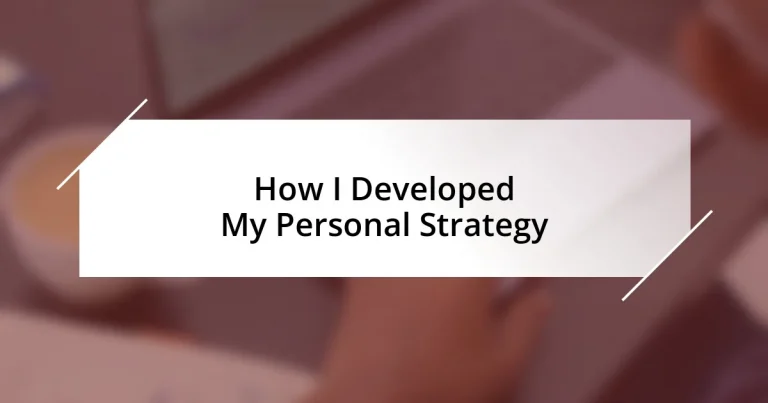Key takeaways:
- Understanding personal strategy requires self-awareness, reflection on goals, and adaptability to changes in life circumstances.
- Identifying core values provides clarity and guides decision-making, enhancing personal and professional relationships.
- Setting SMART goals transforms overwhelming aspirations into manageable tasks and fosters a sense of accomplishment.
- Regularly monitoring progress and being open to adjusting strategies help maintain motivation and align actions with evolving priorities.
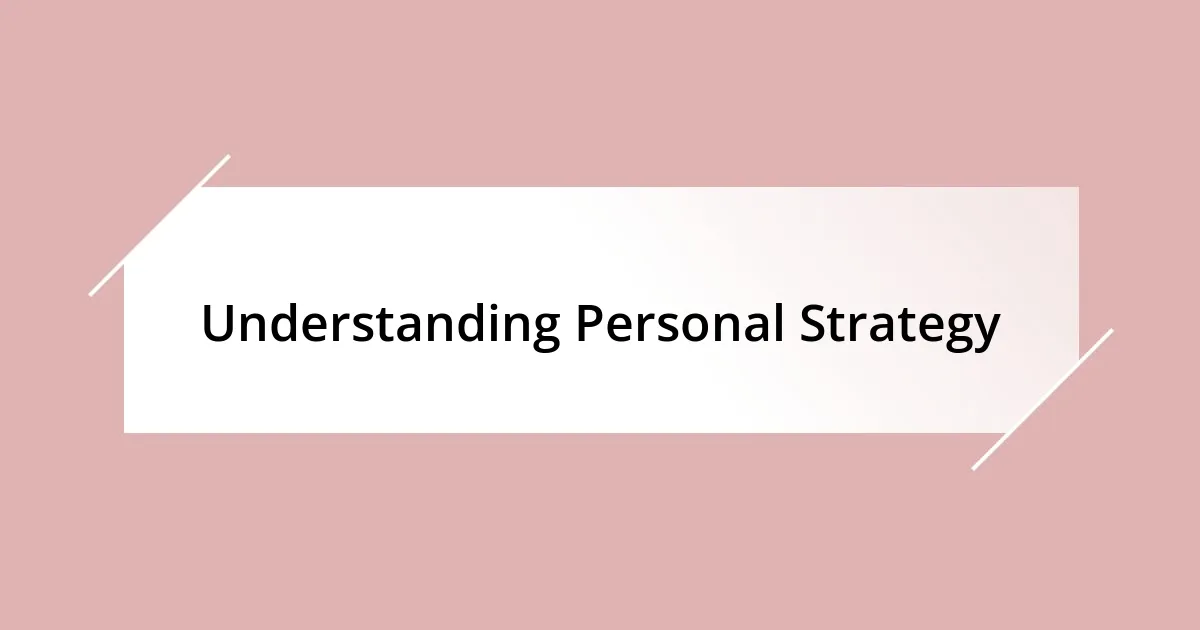
Understanding Personal Strategy
Understanding personal strategy is a journey deeply rooted in self-awareness. I remember a time when I felt lost regarding my goals. It was during a quiet afternoon when I came across an old journal, filled with ideas and aspirations I had forgotten. Reflecting on those words brought clarity and reignited my passion. Have you ever discovered something from your past that reshaped your perspective?
When I think about personal strategy, I realize it’s not a one-size-fits-all approach. It’s about crafting a roadmap that aligns with our unique values and dreams. It took time and some trial and error for me to pinpoint what truly mattered—balancing my career ambitions with personal fulfillment. How do you prioritize the various aspects of your life to ensure they complement each other?
Lastly, embracing flexibility is essential in developing a personal strategy. Life throws unexpected challenges our way, and I’ve learned that adapting my strategy can lead to growth instead of feeling defeated. For instance, when I changed careers, my initial plan shifted dramatically, requiring me to reassess my goals. Have you ever faced a situation where you had to pivot and how did it influence your journey?
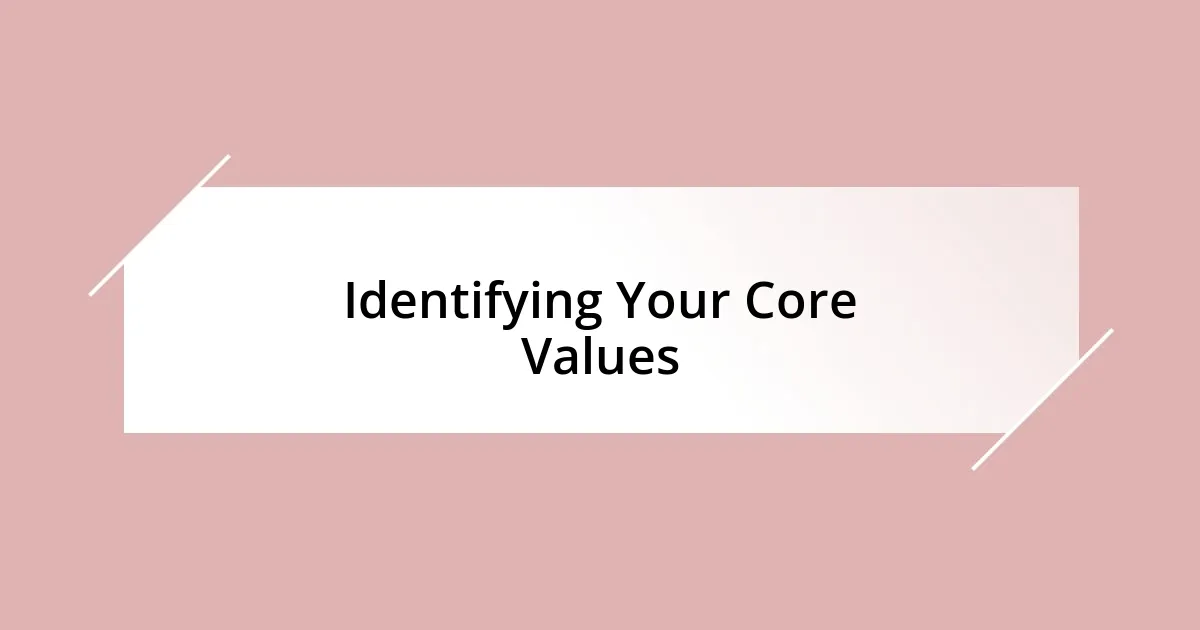
Identifying Your Core Values
Identifying your core values is like unearthing buried treasure. I still vividly recall a particular evening when I sat down with a cup of tea, determined to outline what really drove me. As I penned my values—honesty, creativity, and compassion—I felt a sense of relief wash over me. These core principles guided my choices and actions, ensuring I remained true to myself even in challenging situations. Have you ever paused to think about what truly fuels your decisions?
As I delved deeper into my core values, I realized their profound impact on my relationships, both personally and professionally. For example, embracing honesty allowed me to cultivate deeper connections with friends and coworkers, resulting in a more supportive environment. It’s remarkable how clearly defining what matters most can change the way we interact with the world. Isn’t it fascinating how our values shape not just our paths, but the people around us as well?
Creating a visual representation of my core values also proved beneficial. I remember crafting a simple mind map that connected each value to specific goals, giving me clarity and motivation. Over time, whenever I felt uncertain, I would glance at this map and reconnect with what mattered most. Doing this transformed the way I approached challenges and decisions in my life. Have you ever thought about how visualizing your values could clarify your life choices?
| Core Value | Personal Impact |
|---|---|
| Honesty | Deepens relationships and builds trust. |
| Creativity | Encourages innovative thinking and problem-solving. |
| Compassion | Fosters empathy, leading to stronger community ties. |
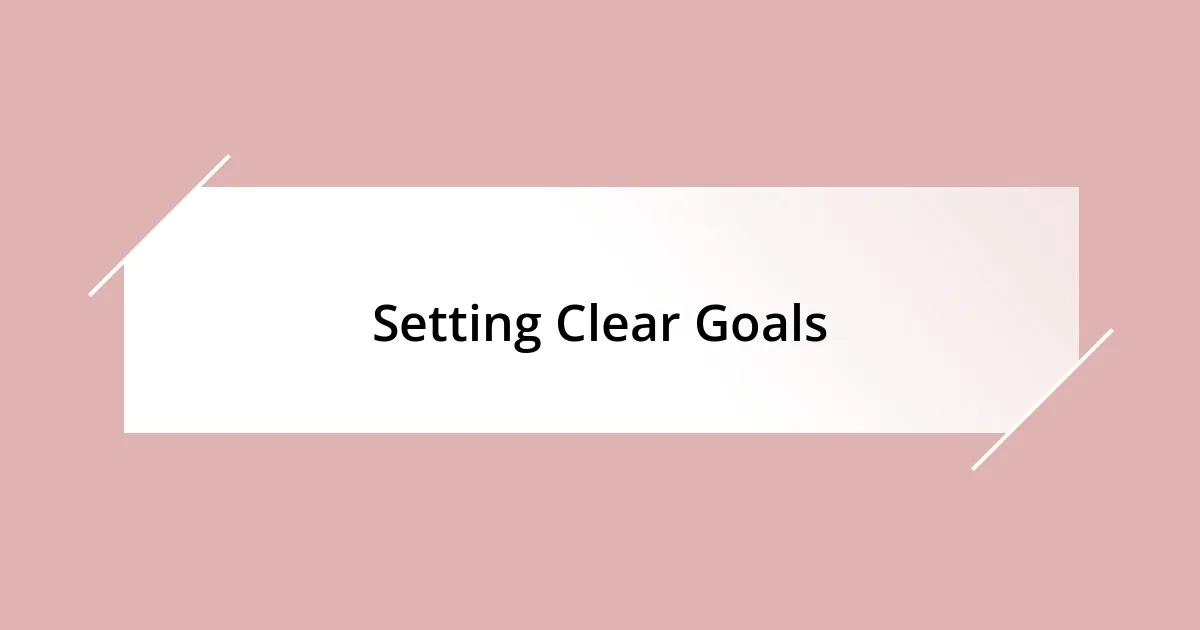
Setting Clear Goals
Setting clear goals was a pivotal step in my personal strategy, acting like the compass that guided my journey. I remember sitting down one rainy weekend with a cup of coffee, feeling the weight of indecision. This was when I realized the importance of clarity; I took the time to write down specific, measurable, achievable, relevant, and time-bound (often referred to as SMART) goals. It was liberating. Suddenly, what once felt overwhelming became neatly categorized into manageable tasks.
Here’s what I focused on when setting my goals:
- Specific: Clearly defined what I wanted to achieve, whether in my career or personal life.
- Measurable: Established criteria to track my progress, making it easier to stay motivated.
- Achievable: Ensured my goals were realistic; something I could genuinely work towards.
- Relevant: Aligned each goal with my core values and passions to maintain enthusiasm.
- Time-bound: Set deadlines that provided structure and a sense of urgency.
This process illuminated paths I hadn’t considered before. One of my goals was to enhance my skills through online courses. By setting a deadline for completion, I felt a newfound focus and purpose. Reflecting on how these goals transformed my life ignites gratitude within me; it’s empowering to see the tangible outcomes of such intentionality.
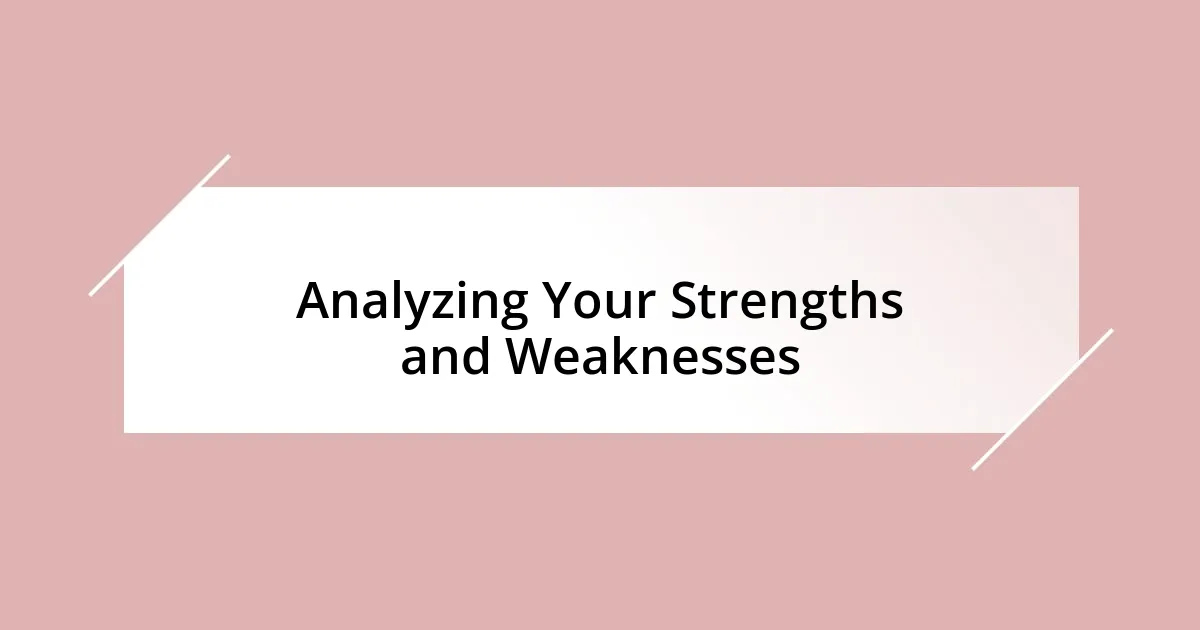
Analyzing Your Strengths and Weaknesses
Understanding one’s strengths and weaknesses is crucial for personal growth and strategy development. I remember a moment during a performance review at work when my manager highlighted my strong analytical skills. It was a proud moment, but it also made me reflect on how often I underestimated this ability. Embracing the fact that I’m detail-oriented allowed me to leverage this strength, yet I also became acutely aware of my tendency to overthink. Have you ever noticed how our strengths can sometimes devolve into weaknesses if left unchecked?
As I sat down to list my strengths, I realized the importance of balancing them against my weaknesses. For instance, I noted my initiative and drive but also recognized that I often struggle with delegation. Reflecting on this struggle not only helped me identify areas for improvement but also pushed me to seek help from colleagues. When was the last time you looked at your weaknesses not as failures but as opportunities for growth? That shift in perspective can be a game changer.
Analyzing my strengths and weaknesses proved to be a continuous journey. I found value in seeking feedback from friends and family, as their insights often uncovered qualities I hadn’t considered. One specific instance was when a close friend pointed out my empathy; I had always viewed it as a natural trait. Yet, acknowledging it as a strength allowed me to use it more intentionally in my personal and professional relationships. I wonder if you’ve tapped into the perspectives of those around you; sometimes, they see the best in us even when we don’t.
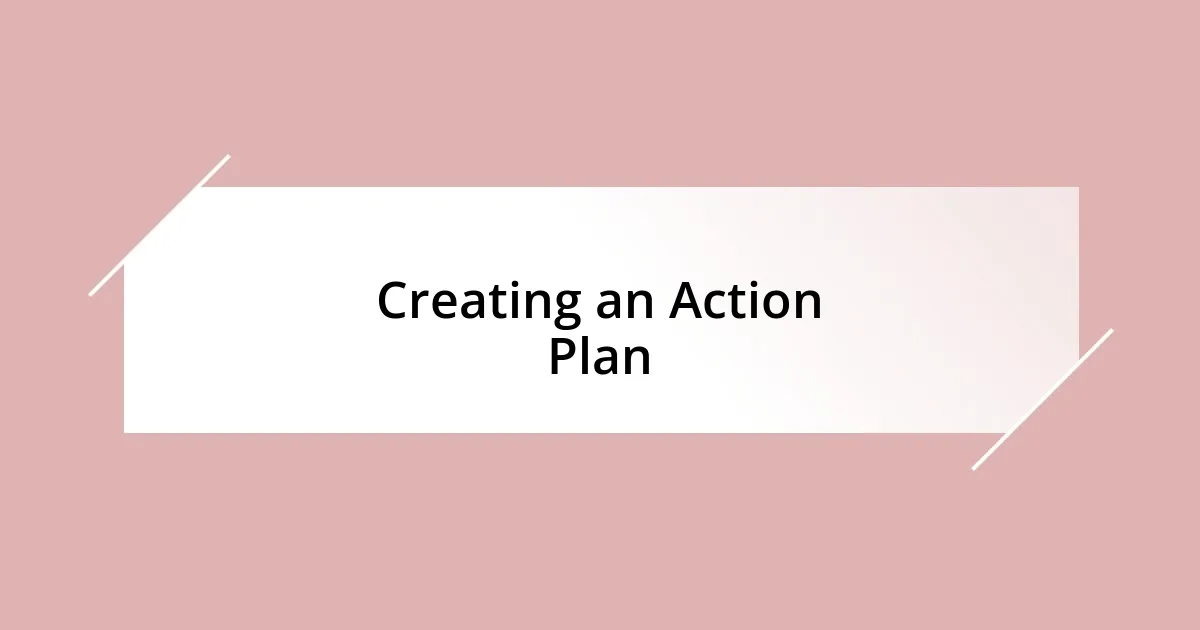
Creating an Action Plan
Creating an action plan was one of those transformative moments in my life. I vividly remember my excitement as I crafted this blueprint—it felt like laying down the foundation for a home I was determined to build. I categorized my goals into actionable steps; for instance, if learning a new programming language was a goal, I would break it down into weekly chapters to tackle. Isn’t it interesting how making a task smaller can make it seem less daunting?
As I ventured deeper into this process, I discovered the importance of flexibility. One week, I found myself overwhelmed with my schedule, so I adjusted my action plan to make room for unexpected events without guilt. It dawned on me that life is inherently unpredictable, and honoring that fact helps maintain motivation. Have you ever tried to stick to a rigid plan only to feel disheartened when life happened? Embracing this adaptability has become a key lesson for me.
One aspect that truly enriched my action plan was incorporating time for reflection. At the end of each month, I dedicated a few hours to review my progress. It was like catching up with an old friend—remembering the high points and recognizing the hurdles I’d faced. I found peace in acknowledging my achievements, big or small. How often do we celebrate our wins? This practice not only strengthened my resolve but also kept my enthusiasm alive as I charted my path forward.
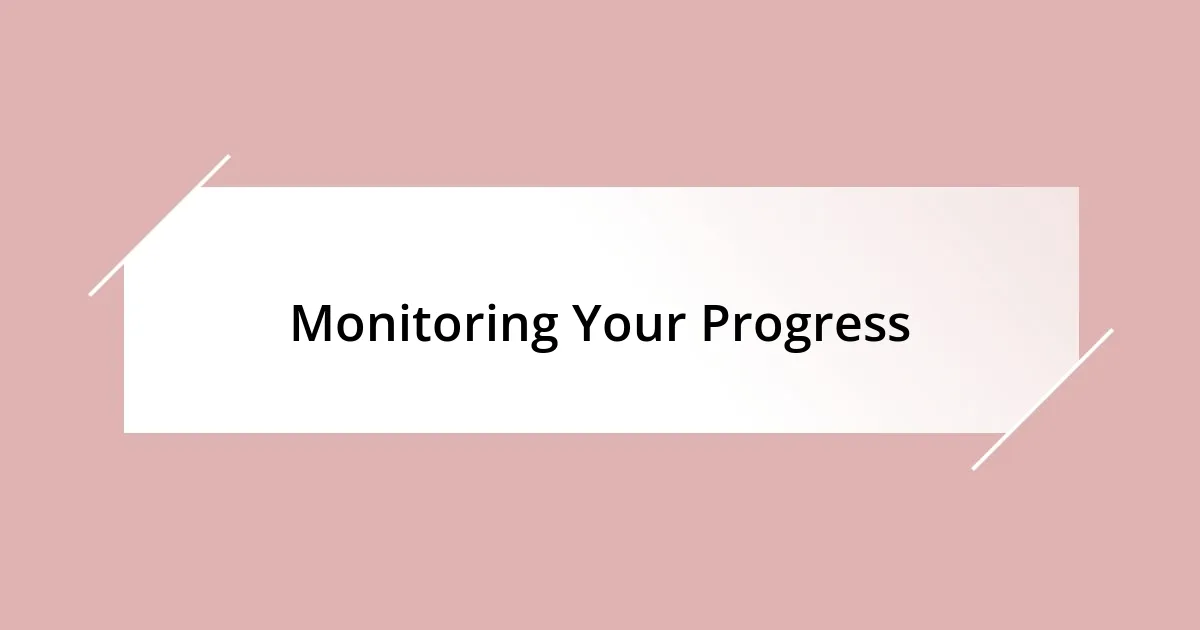
Monitoring Your Progress
Monitoring my progress became a pivotal part of my personal strategy. I set aside time each week to reflect on how I was doing with my goals. It felt liberating to sit quietly with my thoughts, allowing myself to evaluate what was working and what wasn’t. Have you ever just paused to take stock of your journey? That moment of self-assessment can shine a light on both your triumphs and obstacles.
As I looked back on my advancements, I took note of the areas where I excelled and those that required more effort. I remember a week when I realized I was consistently missing deadlines despite my best intentions. This forced me to reevaluate my time management skills; was I being unrealistic in my expectations? Realizing I needed to simplify my tasks and set smaller, achievable goals made a huge difference. Have you experienced that moment of clarity about your own habits?
The real breakthrough came when I started tracking my progress visually. I created a simple chart to plot my achievements each month. Seeing my progress laid out before me was incredibly motivating—it felt like watching a plant grow! When I hit a milestone, I’d celebrate it, often treating myself to a favorite meal. This ritual wasn’t just about the food; it was a powerful reminder that recognizing our growth can fuel our determination. How do you celebrate your milestones? It’s those little acknowledgments that keep us moving forward.
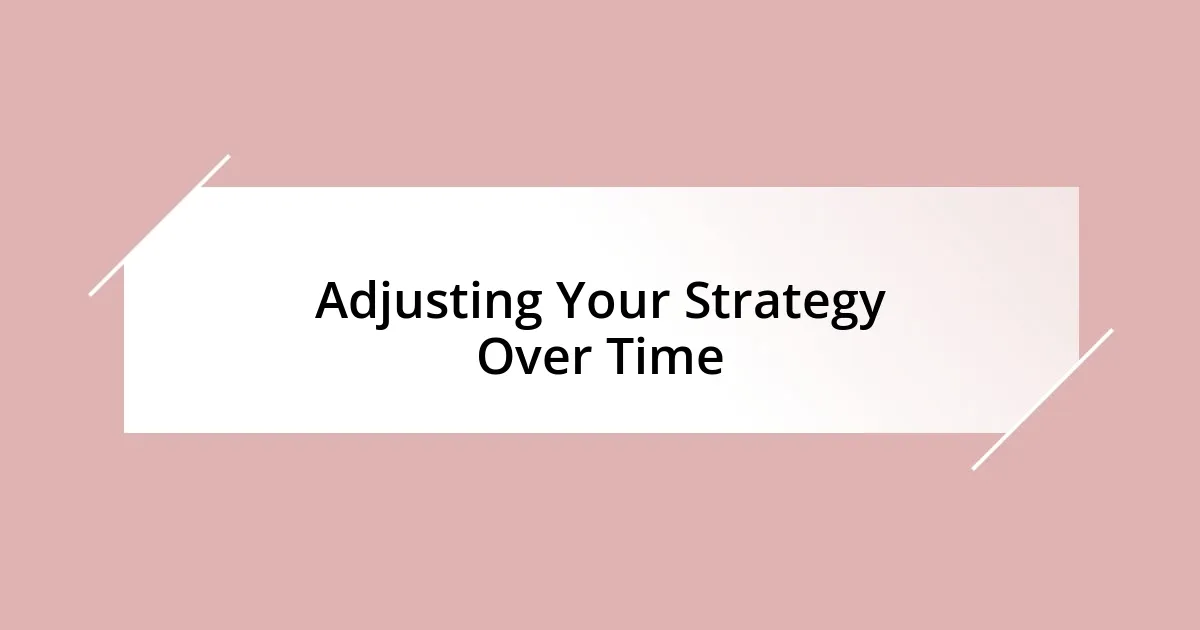
Adjusting Your Strategy Over Time
Adjusting my strategy over time has been both a necessity and a revelation. I recall a period when I felt my goals were slipping away, and it hit me hard. Instead of clinging to my original plan, I accepted that change was crucial. Have you ever experienced that sinking feeling when your efforts don’t seem to align with your aspirations? I realized that by simply recalibrating my focus, I could breathe new life into my strategy.
One memorable instance was when I pivoted from pursuing a fitness goal to prioritizing mental health instead. I had been training for a half-marathon, but during that time, I struggled with anxiety. The decision to adjust my focus was not easy; it felt like I was letting myself down. Yet, embracing activities like yoga and mindfulness led to incredible clarity in my mind. It’s fascinating how sometimes we need to steer away from our original goal to discover what we genuinely need. Have you ever found your intended path no longer served you?
I’ve also learned that feedback from trusted friends or mentors can play a vital role in refining my strategy. When a close friend pointed out that I seemed stressed rather than fulfilled with my pursuits, it struck a chord. Their observation prompted a valuable discussion about my priorities, leading me to adjust my strategy for a clearer and more enriching direction. Isn’t it amazing how an outside perspective can shine a light on what we might overlook in our self-reflections? Embracing this feedback has been like adding a new tool to my kit, making my journey even richer.












